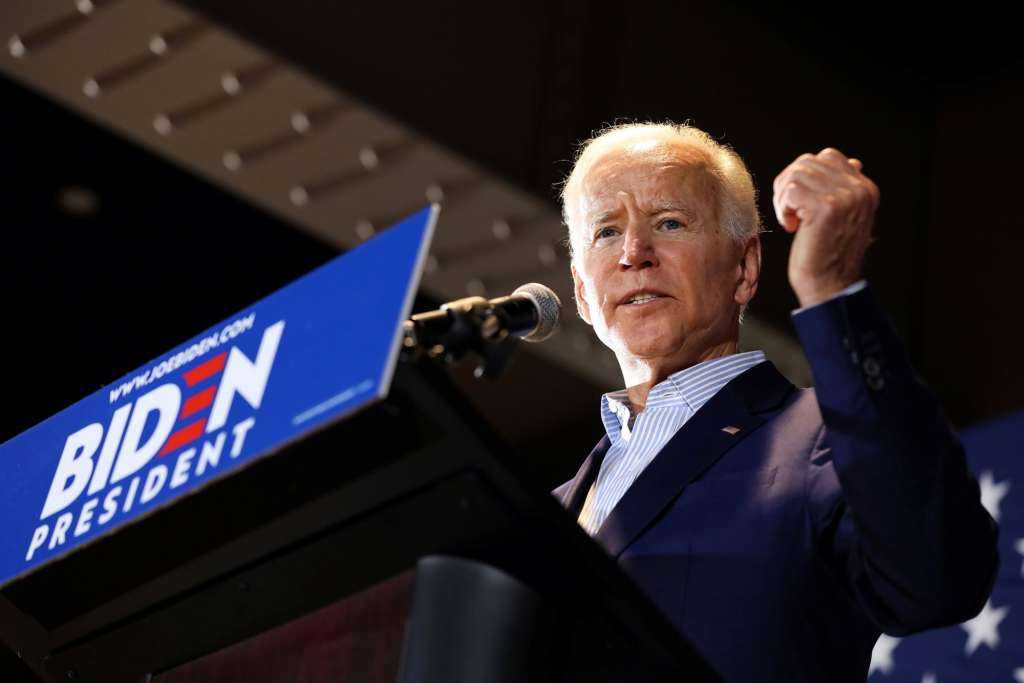He’s preparing for a transformative presidency.
Story by Franklin Foer, The Atlantic
If joe biden prevails, his basement will rest alongside William McKinley’s front porch in the annals. In his subterranean retreat, Biden not only sat still while his opponent spectacularly self-destructed, but also underwent a metamorphosis. He entered it a cautious pragmatist, yearning for a reversion to the time before Donald Trump; he left convinced of his chance to become a latter-day Franklin D. Roosevelt.
Over the spring and summer, Biden inverted the historic template of the Democratic nominee. According to time-honored political logic, a candidate poses as a bleeding heart in the primary, only to retrace his or her steps back to the center in the general. During his time in his basement, by contrast, Biden’s ambitions for the presidency began to acquire a grandiosity that his intramural battle with Bernie Sanders hardly anticipated.
Following two consecutive presidents who professed to disdain politics, Biden is a politician to the core—attuned to the limits of the possible, always finding his way to the epicenter of the zeitgeist. As he cocooned in Delaware, the pandemic, the ensuing economic fallout, and the protests against racial inequality reset the context for the next presidency. Biden grasped that.
On paper, Biden has proposed the most progressive administration in American history. According to a Columbia University study, if the totality of the Biden agenda were implemented, it would lift 20 million Americans out of poverty.
Many on the left scoff at the notion that Biden is preparing for a transformational presidency. They point to his authorship of the 1994 crime bill, his advisers who moan about the dangers of deficits, and his long-held belief in the possibility of bipartisan compromise. Biden remains blissfully unattuned to the pressures exerted by social media, and he seizes nearly every opportunity to distance himself from the Sanders wing of the party. (“Do I look like a radical socialist with a soft spot for rioters?”) When he rejects Medicare for All or defends the wealthy, he means it.
Biden’s political career spanned what is now disparaged by the left as the golden age of neoliberalism. These were the decades of the Democratic Party’s political decline, set against a backdrop of diminishing trust in government. Gary Hart, Bill Clinton, Al Gore, and an entire generation of center-left politicians argued that the party could restore the legitimacy of the activist state only by shrinking the state’s footprint. This political prescription acquired the trappings of an ideological doctrine. The liberalization of international trade, some argued, could instigate a time of global harmony; freer markets would unleash an endless boom.
Read: What Americans don’t know about Joe Biden
Nor has Biden ever focused purely on political efficiency, which may be why Sanders has found himself so quickly and comfortably endorsing Biden. At bottom, both men view politics as a moral enterprise. Even if Biden’s instincts lead him to take positions that Sanders might consider immoral—where Sanders figures himself a lonely prophet, Biden is the clubbable broker—Biden expresses a genuine revulsion toward bullies; he knits the word dignity into seemingly every speech. Such moral instincts parade through his foreign policy—Biden is one of the few remaining passionate champions of human rights in American politics—and spurred him to draft the Violence Against Women Act.
Where the dominant center-left politicians of the 1980s and ’90s held their noses as they paid the minimum required obeisance to unions, Biden kept talking about the movement with affection. “I am a union man, period,” he likes to say. During the Obama years, the unions viewed him as their best ally inside the White House. He gave them time and a sympathetic hearing.
Cynics might assume that these ideas are not plans so much as ploys to appease Sanders supporters. Biden saw how Hillary Clinton failed to make peace with Sanders in 2016 and wanted to avoid that fate. But Biden’s new policies mesh with his value: His presidential agenda reflects a relatively organic pivot in his thinking. And an unchanging piece of psychology will stoke Biden’s ambitions to go big. Despite all his years in the Washington establishment—as a fixture of the Council on Foreign Relations, a denizen of green rooms—he’s clearly felt like a bit of an outsider. In the past, his insecurity about being a University of Delaware alum in rooms filled with Ivy Leaguers led him to exaggerate his academic credentials, scandalously so. According to his advisers, he still carries a sense that he hasn’t been given his full due. Where past presidents exuded supreme self-confidence, with little doubt about how the world should perceive them, Biden feels as if he needs to claw his way into history. He will govern to debunk any lingering sense that he is a placeholder.
Biden’s skeptics on the left fret that his administration will serve as an in-gathering for a dispersed Democratic establishment that is tethered to Wall Street and obsessed with deficits. They fear a restoration of the same wonks that served in the Obama administration, a group that is said to have no appetite for challenging entrenched interests, because they are the entrenched interests. (When news broke earlier this summer that former Treasury Secretary Larry Summers was advising the campaign, Biden’s progressive skeptics began wailing about the return of their longtime bête noire.)
Jake Sullivan, a stalwart of Biden’s inner circle, exemplifies the shift. Everything in his résumé—his Rhodes Scholarship, his years as a Hillary Clinton aide-de-camp—suggests that he would advise his boss to govern in the technocratic mold of Barack Obama. But Sullivan has vocally championed the Democrat’s rediscovery of populist economics. In 2018, he wrote a long essay in the journal Democracy urging robust public investment and the waging of war on monopoly, a return to the spirit of liberalism that more or less preceded Bill Clinton’s arrival on the scene. “The bottom line is that Democrats should not blush too much, or pay too much heed, when political commentators arch their eyebrows about the party moving left. The center of gravity itself is moving, and this is a good thing.”
Much of Biden’s inner circle has adopted a variation on this attitude. One of his former chiefs of staff, Bruce Reed, a veteran of the centrist Democratic Leadership Council, has become a tough critic of Big Tech; he helped write California’s new privacy regulations, curbing Silicon Valley’s power to surveil. Another of Biden’s counselors, Ron Klain, a contender for White House chief of staff, is a ubiquitous presence on Twitter, and has spent the past four years steeped in the resistance to the Trump presidency. Klain has also been a pugilistic critic of what the Republican Party has become.
Astory from the early Obama years hints at how Biden might govern. In 2009, Biden was charged with implementing the $787 billion Recovery Act, which the Obama administration had designed with technocratic rigor. Obama took what he described as “perverse pride” in how his administration elevated policy considerations ahead of political ones. The administration had to choose between cutting taxes by withholding less money from paychecks, or by issuing rebates. Consumers tend not to notice a slightly higher paycheck, and spend the extra money unthinkingly; they do notice rebates, and filter them into savings accounts. Because the administration wanted to stimulate the economy, it went with the subtler approach—and as a result, most Americans had no idea that Obama had cut their taxes.
One of the great failings of the modern Democratic Party is that its technocratic elite often permitted themselves to govern in the realm of abstraction, to construct overly elaborate blueprints. Democrats created what the political scientist Suzanne Mettler calls the “submerged state,” a government that does so little to advertise its place in quotidian life that the public hardly realizes its existence. What makes the possibility of a Biden presidency so promising isn’t simply that he will ambitiously deploy government, but that he’ll sweat the politics of that expansion; he’ll worry about the marketing and attempt to preempt an inevitable backlash. In a time when the public has lost faith in institutions, he has a history of building that trust.
Although Biden hasn’t sworn off running in 2024, everything about his age and demeanor hints at a one-term presidency. Rather than evidence of diminishing vigor, that limited opportunity to govern might prove a wellspring of energy. He knows he has only a fleeting opportunity to fix the crisis of the century, just a short moment in which to realize his basement dreams of transformation.





